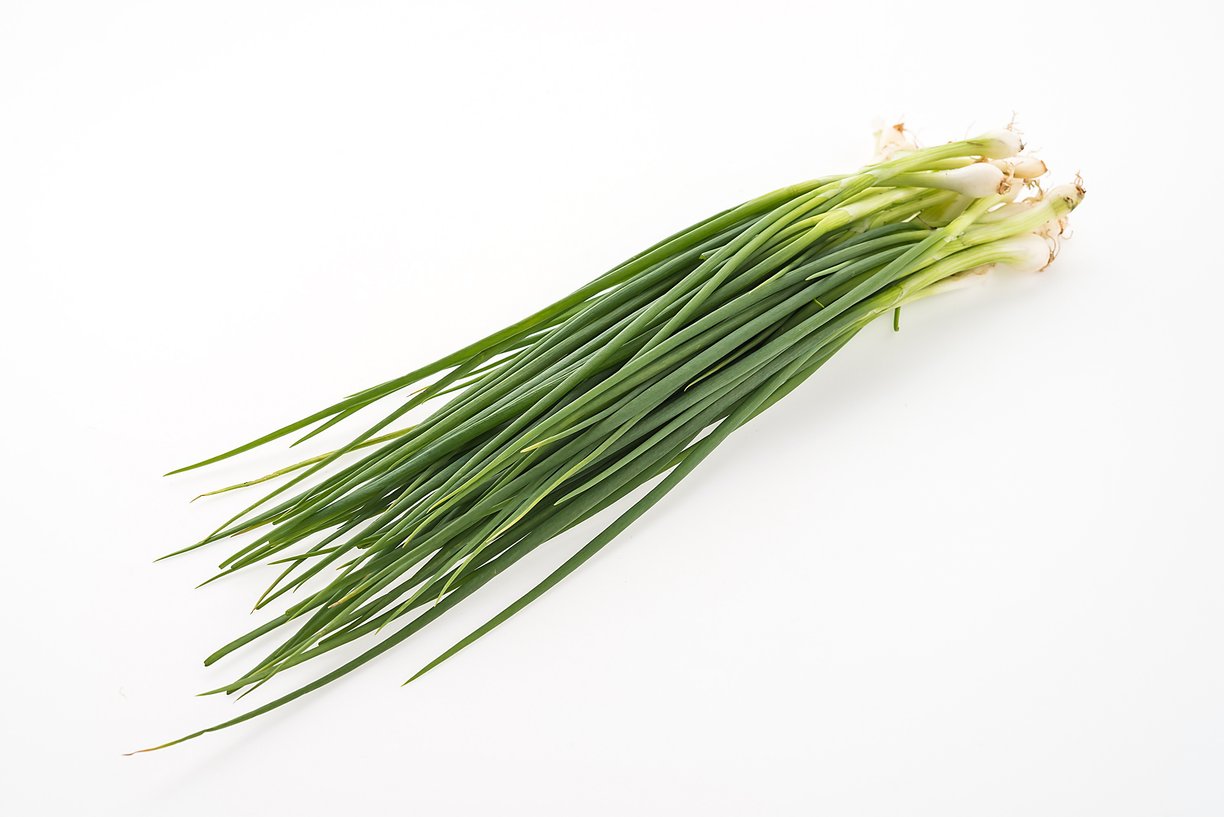Onions
The medicinal properties of onions have been recognized since ancient times, when they were used to treat ailments like headaches, heart disease, and mouth sores. 1. Packed With Nutrients Onions are nutrient-dense, meaning they’re low in calories but high in vitamins & minerals. One medium onion has just 44 calories but...
HEALTHY & FUN FRUITY FACTS
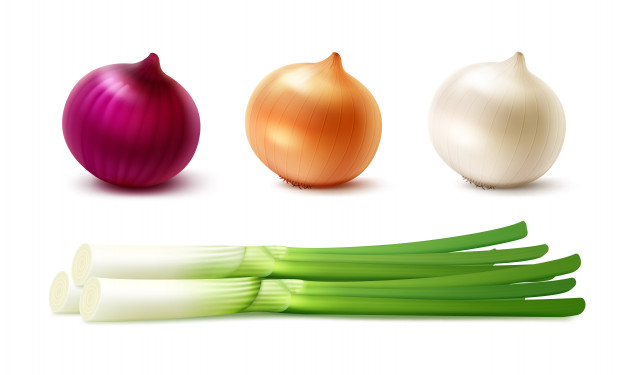

Onions
The medicinal properties of onions have been recognized since ancient times, when they were used to treat ailments like headaches, heart disease, and mouth sores.
1. Packed With Nutrients Onions are nutrient-dense, meaning they’re low in calories but high in vitamins and minerals. One medium onion has just 44 calories but delivers a considerable dose of vitamins, minerals, and fiber.
This vegetable is particularly high in vitamin C, a nutrient involved in regulating immune health, collagen production, tissue repair, and iron absorption. Vitamin C also acts as a powerful antioxidant in your body, protecting your cells against damage caused by unstable molecules called free radicals. An antioxidant, this vitamin is needed for immune function and maintenance of skin and hair.
Onions are also rich in B vitamins, including folate (B9) and pyridoxine (B6) — which play key roles in metabolism, red blood cell production, and nerve function. A water-soluble B vitamin, folate is essential for cell growth and metabolism and especially important for pregnant women. Found in most foods, Vitamin B6 is involved in the formation of red blood cells.
Lastly, they’re a good source of potassium, a mineral which many people are lacking. In fact, the average potassium intake of Americans is just over half the recommended daily value (DV) of 4,700 mg. Normal cellular function, fluid balance, nerve transmission, kidney function, and muscle contraction all require potassium. This essential mineral can have blood-pressure-lowering effects and is important for heart health.
2. May Benefit Heart Health Onions contain antioxidants and compounds that fight inflammation, decrease triglycerides, and reduce cholesterol levels — all of which may lower heart disease risk. Their potent anti-inflammatory properties may also help reduce high blood pressure and protect against blood clots. Quercetin is a flavonoid antioxidant that’s highly concentrated in onions. Since it’s a potent anti-inflammatory, it may help decrease heart disease risk factors, such as high blood pressure.
A study in 70 overweight people with high blood pressure found that a dose of 162 mg per day of quercetin-rich onion extract significantly reduced systolic blood pressure by 3–6 mmHg compared to a placebo.
Onions have also been shown to decrease cholesterol levels.
A study in 54 women with polycystic ovarian syndrome (PCOS) found that consuming large amounts of raw red onions (40–50 grams/day if overweight and 50–60 grams/day if obese) for eight weeks reduced total and “bad” LDL cholesterol compared to a control group.
Additionally, evidence from animal studies supports that onion consumption may reduce risk factors for heart disease, including inflammation, high triglyceride levels, and blood clot formation.
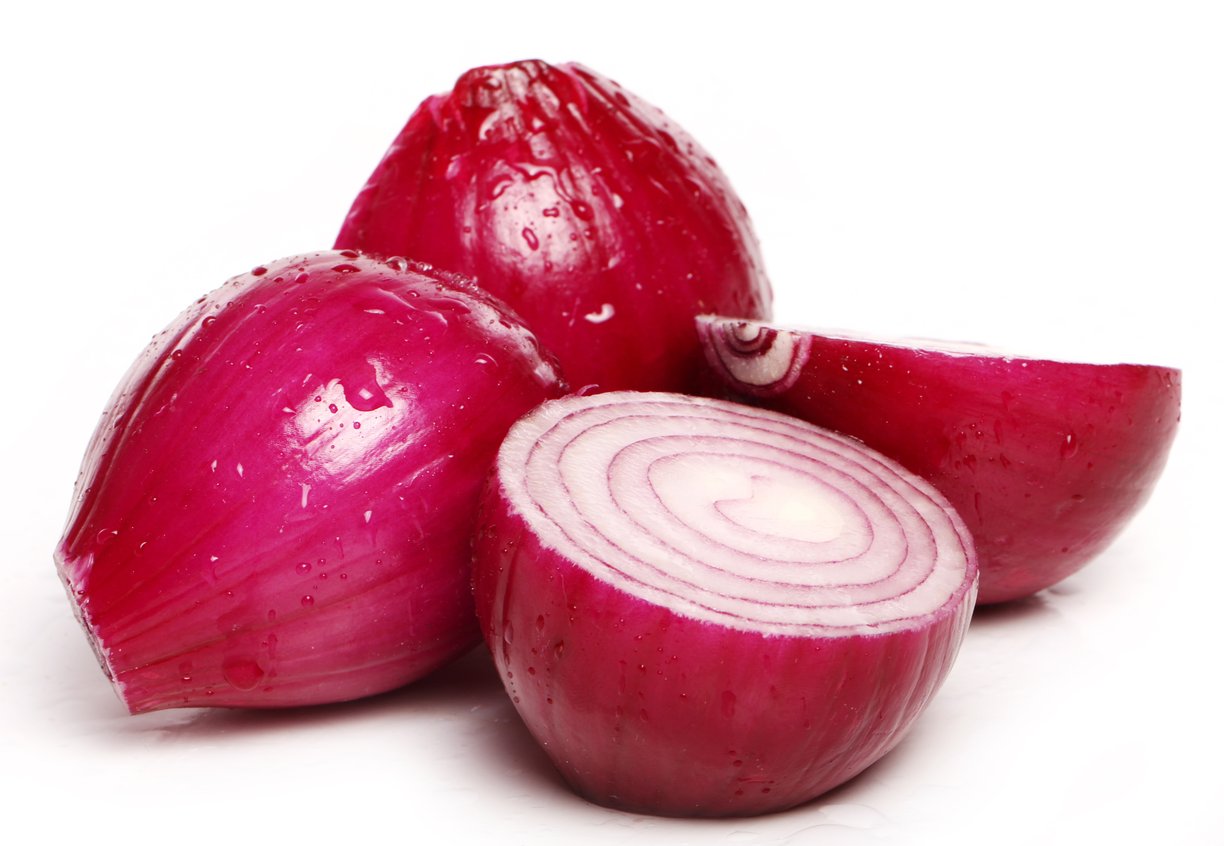

3. Loaded With Antioxidants Antioxidants are compounds that inhibit oxidation, a process that leads to cellular damage and contributes to diseases like cancer, diabetes, and heart disease. Onions are an excellent source of antioxidants. In fact, they contain over 25 different varieties of flavonoid antioxidants.
Red onions, in particular, contain anthocyanins — special plant pigments in the flavonoid family that give red onions their deep color.
Multiple population studies have found that people who consume more foods rich in anthocyanins have a reduced risk of heart disease. For example, a study in 43,880 men showed that habitual intakes as high as 613 mg per day of anthocyanins were correlated to a 14% lower risk of nonfatal heart attacks.
Similarly, a study in 93,600 women observed that those with the highest intake of anthocyanin-rich foods were 32% less likely to experience a heart attack than women with the lowest intake.
Additionally, anthocyanins have been found to protect against certain types of cancer and diabetes.
4. Contain Cancer-Fighting Compounds Eating vegetables of the Allium genus like garlic and onions has been linked to a lower risk of certain cancers, including stomach, colorectal, breast, and prostate. Cancer is a common disease, characterized by uncontrolled cell growth. It is one of the world’s leading causes of death.
A review of 26 studies showed that people who consumed the highest amount of allium vegetables were 22% less likely to be diagnosed with stomach cancer than those who consumed the least amount.
Moreover, a review of 16 studies in 13,333 people demonstrated that participants with the highest onion intake had a 15% reduced risk of colorectal cancer compared to those with the lowest intake.
These cancer-fighting properties have been linked to the sulfur compounds and flavonoid antioxidants found in allium vegetables. For example, onions provide a sulfur-containing compound that has been shown to decrease tumor development and slow the spread of ovarian and lung cancer in test-tube studies. Onions also contain fisetin and quercetin, flavonoid antioxidants that may inhibit tumor growth.
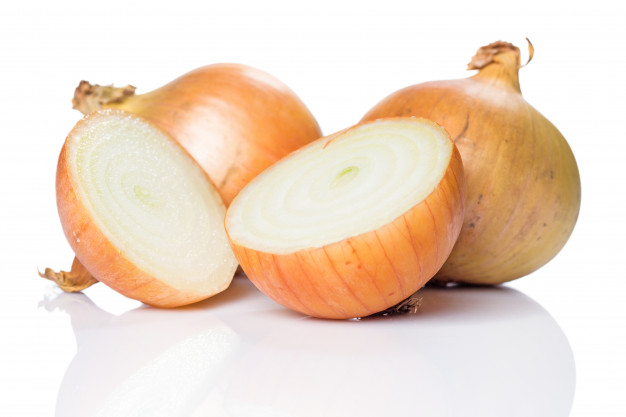

5. Help Control Blood Sugar Eating onions may help control blood sugar, which is especially significant for people with diabetes or prediabetes. Type 2 diabetes is a common disease, characterized primarily by high blood sugar levels. Raw onions may help control both type 1 and 2 diabetes, but more research is needed.
A study in 42 people with type 2 diabetes demonstrated that eating 3.5 ounces (100 grams) of fresh red onion reduced fasting blood sugar levels by about 40 mg/dl after four hours.
Additionally, multiple animal studies have shown that onion consumption may benefit blood sugar control. A study showed that diabetic rats fed food containing 5% onion extract for 28 days experienced decreased fasting blood sugar and had substantially lower body fat than the control group.
Specific compounds found in onions, such as quercetin and sulfur compounds, possess antidiabetic effects. These are mainly sulfides and polysulfides, which may protect against cancer. For example, quercetin has been shown to interact with cells in the small intestine, pancreas, skeletal muscle, fat tissue, and liver to control whole-body blood sugar regulation. It may lower blood pressure and improve heart health.
Thiosulfinates: These sulfur-containing compounds may inhibit the growth of harmful microorganisms and prevent the formation of blood clots
6. May Boost Bone Density Though dairy gets much of the credit for boosting bone health, many other foods, including onions, may help support strong bones. Osteoporosis is a common health problem, especially in postmenopausal women. A healthy diet is one of the main preventive measures.
Animal studies reveal that onions protect against bone deterioration and may even increase bone mass.
A study in 24 middle-aged and postmenopausal women showed that those who consumed 3.4 ounces (100 ml) of onion juice daily for eight weeks had improved bone mineral density and antioxidant activity compared to a control group.
Another study in 507 perimenopausal and postmenopausal women found that those who ate onions at least once a day had a 5% greater overall bone density than individuals who ate them once a month or less. Plus, the study demonstrated that older women who most frequently ate onions decreased their risk of hip fracture by more than 20% compared to those who never ate them. It’s believed that onions help reduce oxidative stress, boost antioxidant levels, and decrease bone loss, which may prevent osteoporosis and boost bone density.
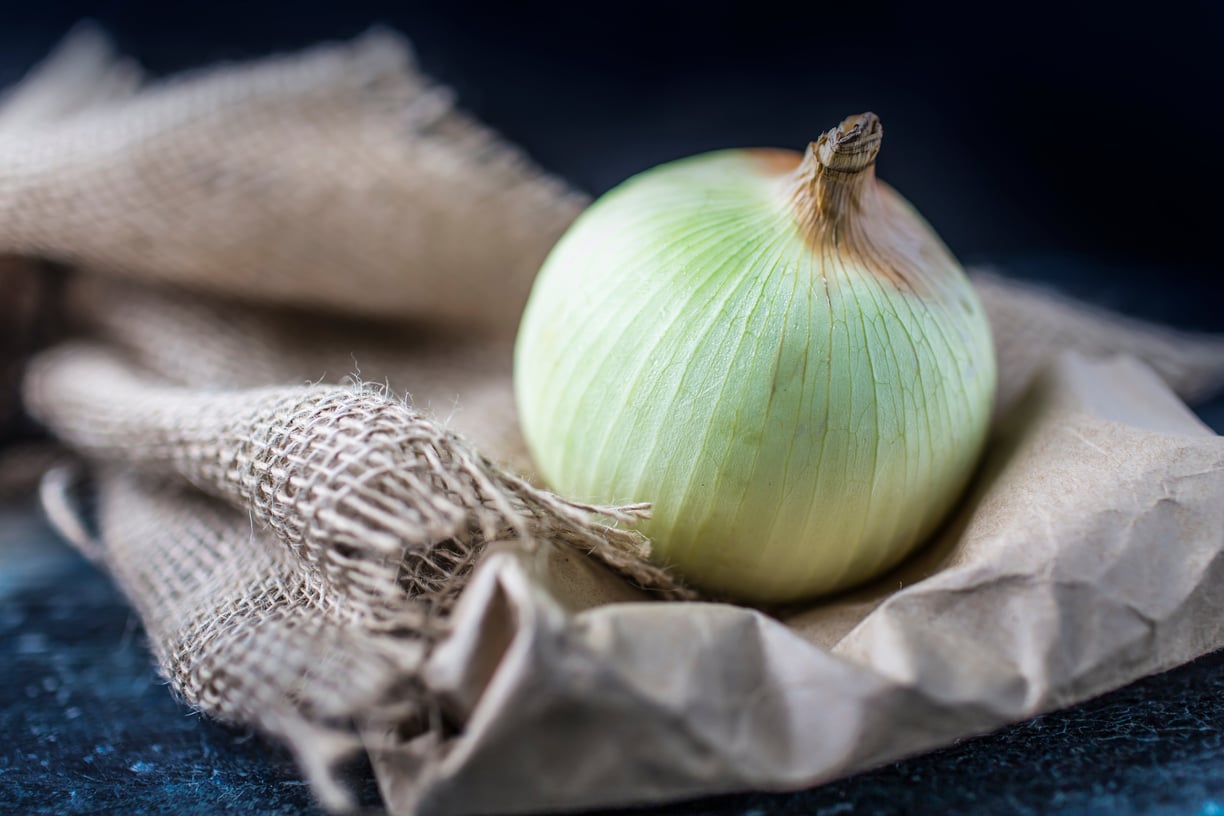

7. Have Antibacterial Properties Onions can fight potentially dangerous bacteria, such as Escherichia coli (E. coli), Pseudomonas aeruginosa, Staphylococcus aureus (S. aureus), and Bacillus cereus. Furthermore, onion extract has been shown to inhibit the growth of Vibrio cholerae, a bacteria that is a major public health concern in the developing world. Quercetin extracted from onions seems to be a particularly powerful way to fight bacteria.
A test-tube study demonstrated that quercetin extracted from yellow onion skin successfully inhibited the growth of Helicobacter pylori (H. pylori) and Methicillin-resistant Staphylococcus aureus (MRSA). H. pylori is a bacteria associated with stomach ulcers and certain digestive cancers, while MRSA is an antibiotic-resistant bacteria that causes infections in different parts of the body.
Another test tube study found that quercetin damaged the cell walls and membranes of E. coli and S. aureus.
8. May Boost Digestive Health Onions are a rich source of fiber and prebiotics, which are necessary for optimal gut health. Prebiotics are nondigestible types of fiber that are broken down by beneficial gut bacteria. Gut bacteria feed on prebiotics and create short-chain fatty acids — including acetate, propionate, and butyrate.
Research has shown that these short-chain fatty acids strengthen gut health, boost immunity, reduce inflammation, and enhance digestion.
Additionally, consuming foods rich in prebiotics helps increase probiotics, such as Lactobacillus and bifidobacteria strains, which benefit digestive health. A diet rich in prebiotics may help improve the absorption of important minerals like calcium, which may improve bone health. Onions are particularly rich in prebiotic inulin and fructooligosaccharides. These help increase the number of friendly bacteria in your gut and improve immune function.
